CUEB Holds the Kick-off Meeting for Undergraduate Education Evaluation
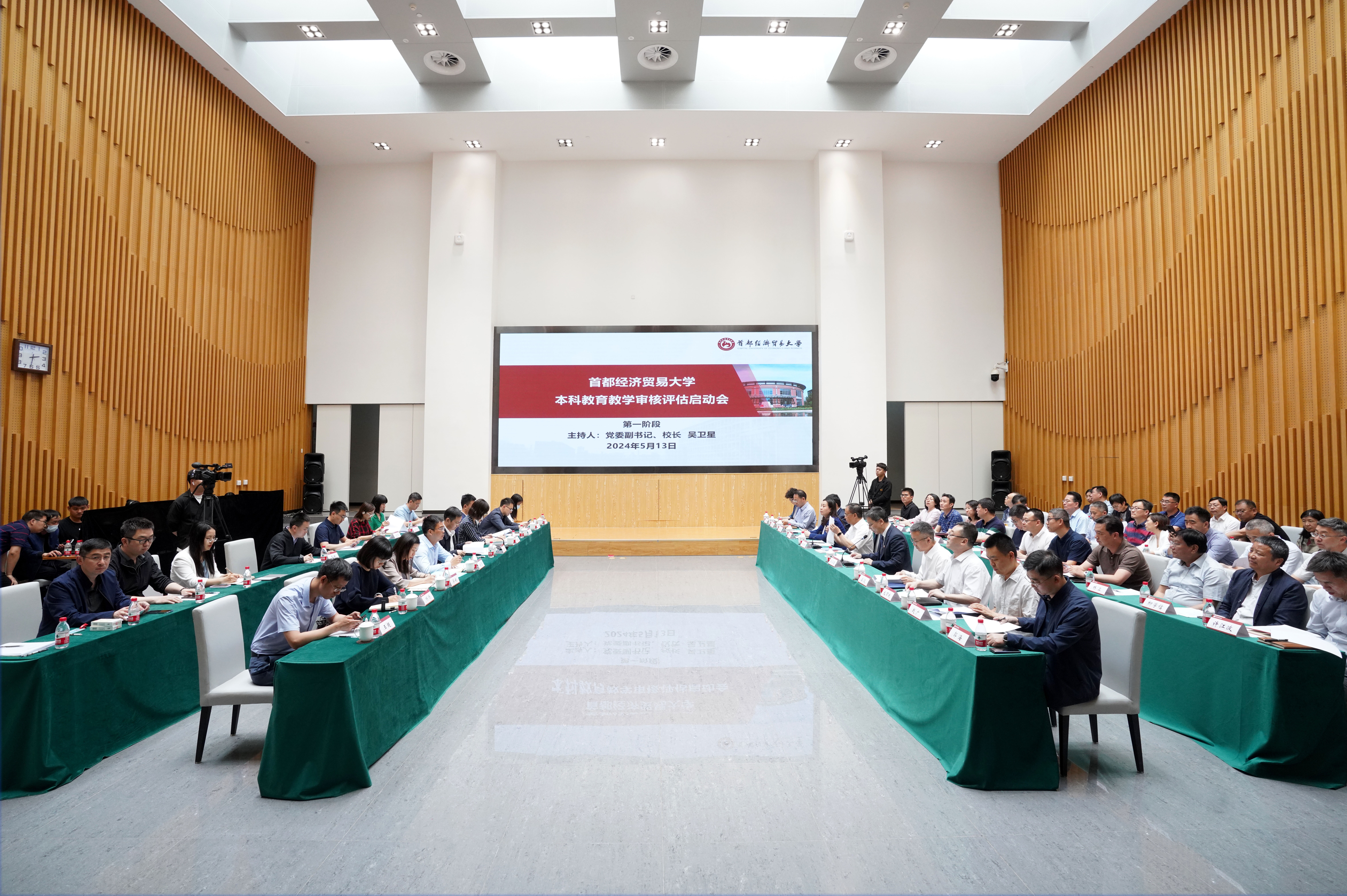
On the afternoon of May 13, CUEB held the kick-off ceremony of undergraduate education evaluation in the Press Room of Boyuan Building both online and offline.
Online and offline attendees included President Cheng Wei, Secretary of the Party Committee of Liaoning University and leader of the evaluation team; President Fu Deyin, Deputy Secretary of the Party Committee of China University of Labor Relations; President Yan Xiangbin, Deputy Secretary of the Party Committee of Guangdong University of Foreign Studies; President Yu Haifeng, Deputy Secretary of the Party Committee of Guangdong University of Finance & Economics; Liang Qi, Deputy Secretary of the Party Committee of Nankai University; Wu Ping, Former Standing Committee of the Party Committee and Vice President of Wuhan University; Gao Wenshu, Standing Committee of the Party Committee and Vice President of University of Chinese Academy of Social Sciences; Ma Yongqiang, Standing Committee of the Party Committee and Vice President of University of Southwestern University of Finance and Economics; Ye Linxiang, Standing Committee of the Party Committee and Vice President of Nanjing University of Finance & Economics; Yan Jianmin, Party Secretary of Education College of Minzu University of China; Yin Fei, Deputy Secretary of the Party Committee, and Dean of the School of Law; Jiang Bin, Chief Project Engineer of China Electronics Technology Group Corporation; Liu Dongdong, Director of Credit Committee of China Enterprise Reform and Development Society; Liu Yi, cadre of Academic Affairs Office of Shenyang University of Chemical Technology; Lu Qiang, Deputy Director of the Academic Affairs Office and Secretary of Beijing Technology and Business University; Zhao Ying, cadre of Academic Affairs Office of Capital Medical University; Li Bin, Deputy Director of the Academic Affairs Office of Beijing Film Academy; Gu Yunyun, cadre of Academic Affairs Office of Capital Normal University, as well as CUEB leaders.
Offline attendees included Ding Dawei, member of the Education Working Committee at the Beijing Municipal Party Committee and Deputy Director of the Beijing Municipal Education Commission (BMEC); Hu Jing, Director of School Inspector Office; Quan Zhi, Director of Evaluation and Monitoring Office; Zhao Guangqing, Deputy Director of the Education Working Committee; Jiang Jing, Deputy Director of Evaluation and Monitoring Office; Feng Yanjun, cadre of Office of Higher Education; Yang Yang, Level Four Researcher of Evaluation and Monitoring Office; Huang Yanxiang and Wang Chao, cadres of Evaluation and Monitoring Office.
The meeting consisted of two parts. The first part was presided over by CUEB President Wu Weixing, deputy secretary of the Party Committee.
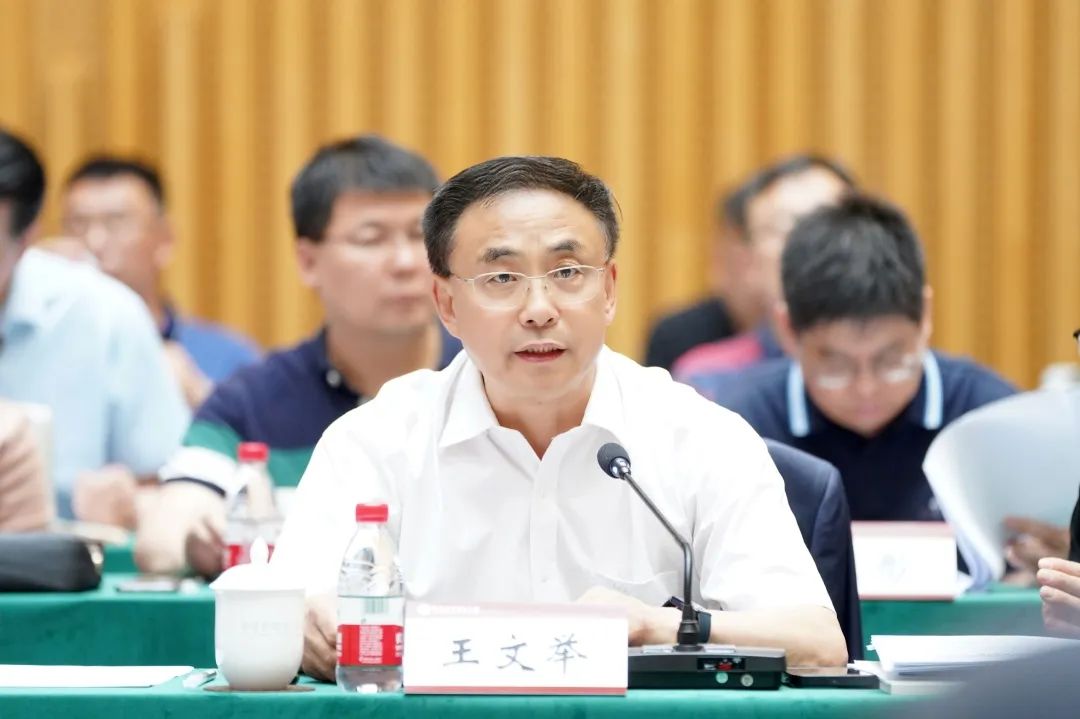
Wang Wenju welcomed and thanked all the experts and leaders in the meeting. Then he provided an overview of CUEB’s overall management. He emphasized that in recent years, the university has prioritized the fundamental mission of fostering virtue through education to advance its educational capacity.
First, clarify the school administration objectives. CUEB aligns with the requirements of the key strategic objectives of serving the country, supporting Capital’s development in the new era as well as the policy of personalized development of Beijing Municipal universities. The school continuously improves the development goals and paths by following the fundamental guideline of “twenty characters”[1], and promotes quality of “six major projects”[2].
Second, foster first-class undergraduate education. CUEB values the construction of high-level research universities and the new round of evaluation to launch high-level featured classes, deepen the reform of personnel training mode, and build a personalized training system for creative, interdisciplinary, and applied professionals (hereafter the training system).
Third, attach great importance to the evaluation work. Through problem-oriented methods, CUEB leverages the evaluation work to deepen comprehensive reforms, highlight the characteristics of CUEB, and strengthen the undergraduate education.
[1] The guideline, originally expressed in 20 Chinese characters, was proposed in National Medium and Long-Term Educational Reform and Development Plan Outline: prioritize development, prioritize fostering individuals, innovate through reform, promote equity, and enhance quality.
[2] The six major projects refer to the “Soul-casting Project” to comprehensively strengthen the Party’s political construction, the “Aggregation Project” to comprehensively promote the work of governing the province according to law, the “Escort Project” to comprehensively enhance the quality of legal services, the “Stability Project” to comprehensively maintain social security and stability, the “Empowerment Project” to comprehensively consolidate judicial administration, and the “Tempering Police Project” to comprehensively forge the ironclad force of judicial administration.
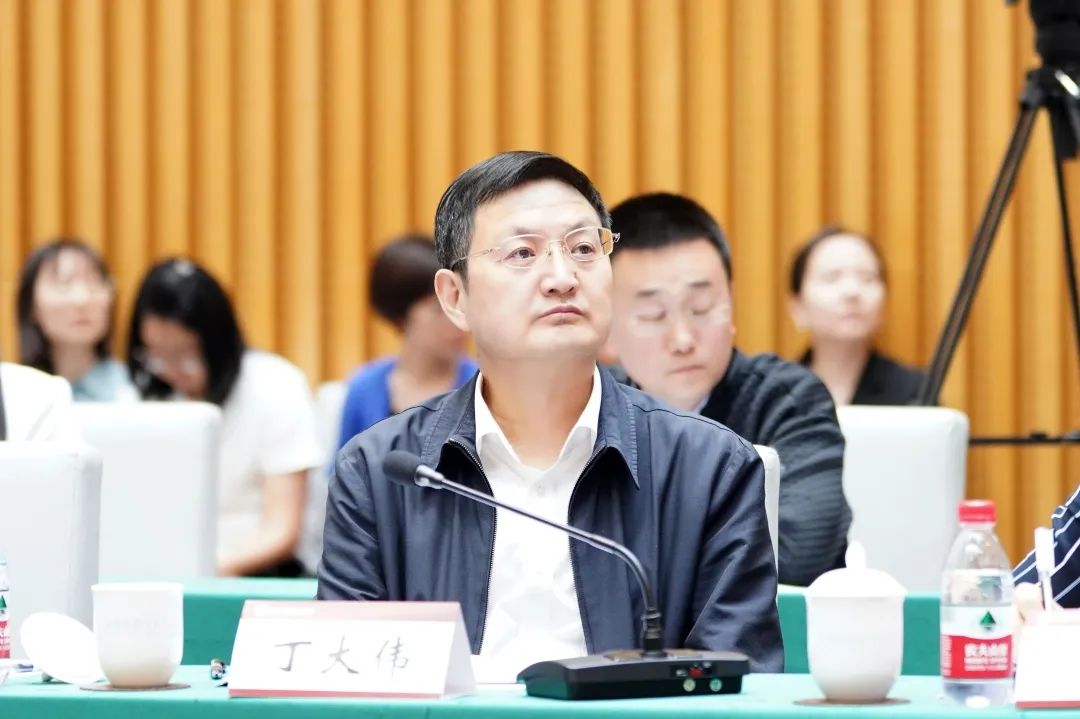
Ding Dawei, member of the CPC Beijing Municipal Education Committee and Deputy Director of the Beijing Municipal Education Commission (BMEC), recognized the achievements of CUEB since the last round of evaluation and outlined the plan of the upcoming evaluation of Beijing Municipal universities. He emphasized that conducting the evaluation work is the inherent necessity for fully implementing the reform of central education evaluation, and an important way to accelerate the construction of a quality assurance system for higher education with Chinese characteristics. He put forward the following expectations for schools:
First, improve the consciousness to enhance the sense of mission and responsibility in the evaluation work. The school should follow the spirit of the new round of evaluation to better support the national strategy and regional socio-economic development.
Second, rectify the orientation to promote the personalized development of Beijing Municipal universities. The school should improve the “four returns” [1], aligning closely with Beijing’s socio-economic development.
Third, adhere to the requirements to ensure the orderly progress of assessments. BMEC, Beijing Municipal Education Working Committee (BMEWC), the expert group and the school should fully play their respective role, enhance communication, and jointly ensure the high quality of evaluation.
[1] The “four returns” refers to the stipulations for undergraduate education proposed by the Minister of Education in 2016: to return to common sense, to duties, to original aspiration, and to dreams.
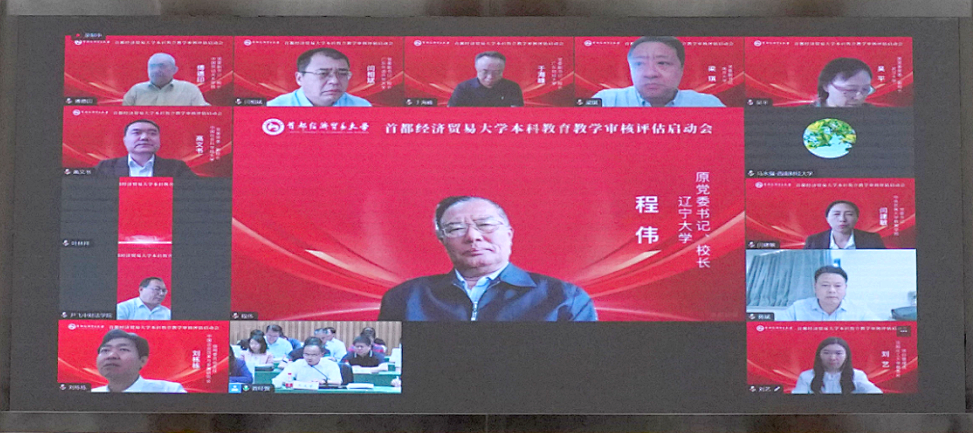
President Cheng Wei, secretary of the Party Committee of Liaoning University, leader of the evaluation team, presided over the second part. Cheng introduced the members of the expert group as well as the tasks and requirements of the evaluation. He stressed that we should fully understand the changes in the new round of evaluation, and jointly improve the quality of undergraduate education.
First, take the effectiveness of fostering virtue through education as the fundamental standard of all the school work. Schools should take a problem-oriented method and test the education reform with evaluation standards.
Second, underline the concept of the community with common education quality. Schools should focus on the key elements affecting undergraduate education, evolve from passive participant to active player to achieve high-quality development.
Third, treat the evaluation normally. Schools should provide evaluation materials objectively and accurately, analyze the difficulties and discuss the corresponding measures with experts.
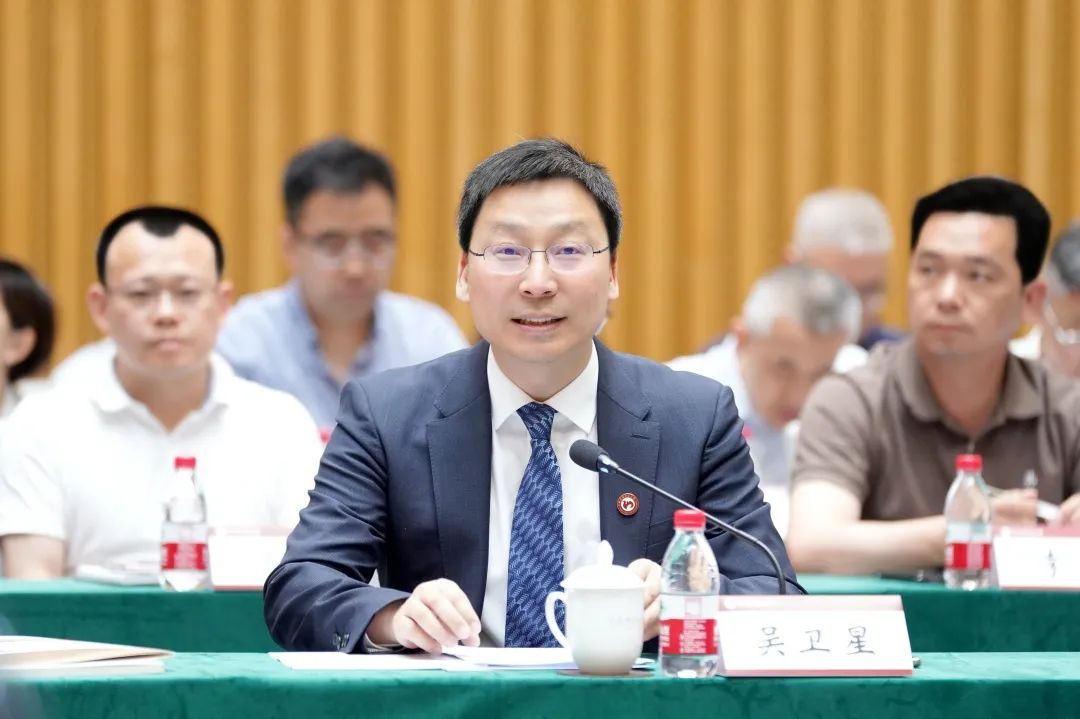
President Wu Weixing, also Deputy Decretary of CUEB Party Committee, provided additional insights into the self-evaluation from four aspects: the construction of a high-level research university, the improvement of undergraduate education, the building of the training system and the efficacy of undergraduate education and teaching. He noticed that CUEB has been working to develop into a high-level research university by addressing the six problems identified in the previous evaluation, and made full preparations for the new one. Wu stressed two main aspects.
On the one hand, the school should highlight the featured and connotative development, and strive to build the training system. CUEB takes measures such as building the ideological and political pattern of the “Three-Wide Education” system (which means all educational workers strive to foster students in all processes and all respects), the digital and intelligent transformation of undergraduate majors, optimizing the professional layout of personnel training, promoting the integration of production and education, of science and education and highlighting its characteristics. It continuously strengthens the system of holistic education, and advances the comprehensive reform of “Three-Wide Education” system in an orderly manner.
On the other hand, CUEB has diligently pursued the fundamental mission of fostering virtue through education, yielding remarkable outcomes in undergraduate education. CUEB has consistently progressed in enrollment, student competition, and employment. As a result, students have developed in an all-round way, with outstanding alumni spreading across various industries and sectors.
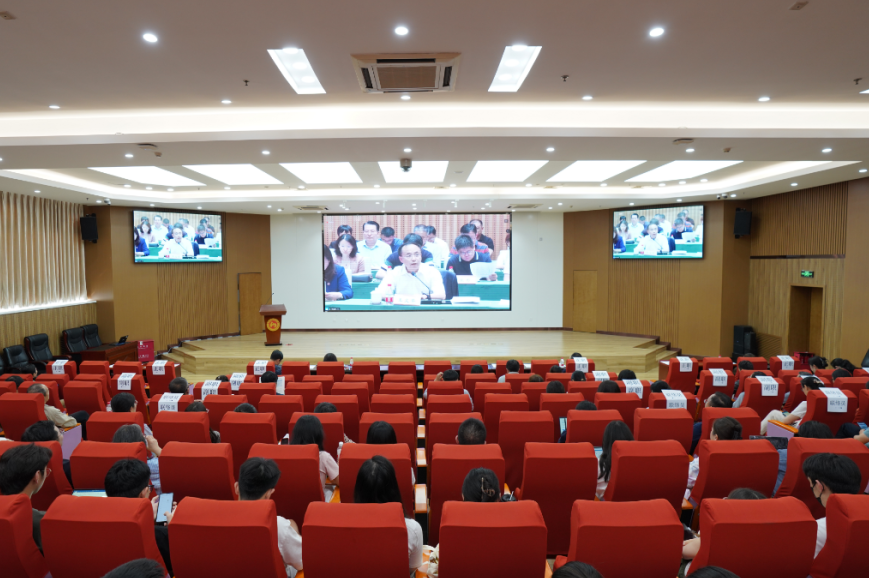
Directors of the Party and Governance Organization, Functional Departments and Academic Resources, Vice Deans of teaching units, Deputy Secretary of Student Affairs Department attended the meeting. Teacher and student representatives attended the meeting at the main venue and branch venue respectively.
CUEB will leverage this evaluation to reinforce the fundamental task of fostering virtue through education, prioritize personnel education. Committed to quality development, CUEB will improve the school education by adjusting disciplinary structures, transforming and upgrading digital and intelligent majors, strengthening the specialized personnel education system, and refining teaching and scientific research incentive mechanisms. Through these efforts, CUEB aims to make greater contributions to Chinese modernization and the capital’s development in the new era!
